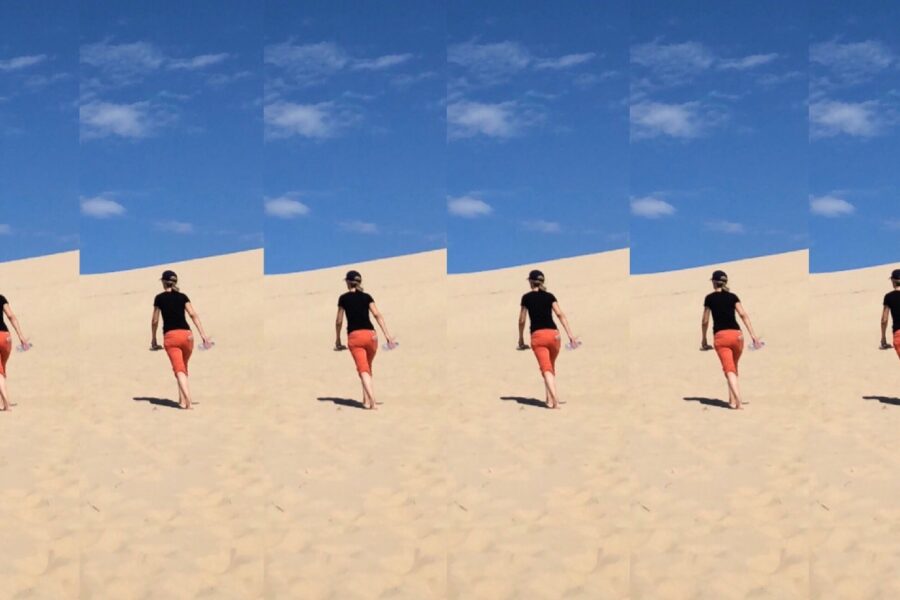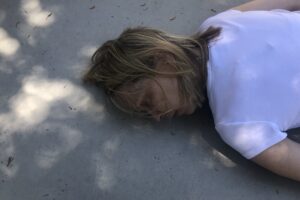I didn’t pursue acting because I wanted to become a star, or because I had signed up for all the plays in high school (there were no plays), or because the art form called to me. I became an actor to force my mouth open, which–due to personality or upbringing–was pretty much wired shut. My first instructor, a teacher from Ryerson University in Toronto, told me that if I wanted to study seriously, I should enroll at The Neighborhood Playhouse in New York or The Royal Academy in London. Which all sounded glamorous in a daydream sort of way, but never-in-a-million-years possible for a girl like me. Fate, however, loved the suggestion and a few years later I found myself relocating to Manhattan and, not long after that, registering at one of those schools. It was a long way to go to find my voice, but I jumped in, a little awestruck, a lot anxious, and utterly clueless for what lay ahead.
The first thing they teach you at The Neighborhood Playhouse is something called the repetition exercise. If you were to visit 54th Street and First Avenue on a sunny day, you’d probably find students on the street corner engaged in the practice. It’s the foundation of Sanford Meisner’s technique (he helmed the institution for 55 years), and you must master it before you’re given a single word of dialogue. The way it works–the way I remember, anyway–is that two actors sit across from one another looking into each other’s face while the audience watches quietly. In time, one of the actors makes an observation saying something like, “You look nervous.” The other actor then repeats those same words, and back and forth they go, restating the line over and over. What happens is that the emotions bubbling up inside of the actors ultimately find their way into the line. So a version of “You look nervous” might be said angrily, or provocatively, or weepy, or in disgust. While the words stay the same, the behavior does not. The object of the lesson is to teach students to listen to each other, excavate true feelings, and put those feelings into their words. Only when this is achieved, when the students authentically communicate with one another, can the line change. Eventually, you get to stand up for the exercise. Then you do it walking into a room or a situation. Finally, after weeks and weeks of repeating yourself, after your defenses and inhibitions have been annihilated, when you cannot endure one more miserable second of practice, they present you with a scene. Which, as you can imagine, is a glorious, day, because repetition is painful.
To be honest, middle age feels like the mother of all repetition exercises. Twenty-six years after leaving theatre school and here I am, squirming and fidgeting, wondering when the line will finally change. When the days will stop feeling so incredibly familiar; the patterns so obvious; the responses so rote. To me, this is the essence of a midlife crisis. Wanting change so desperately but not knowing how to go about it. So you create a bucket list. You start a blog. You shoot a bevy of injectables into your face. Or you pull the pin and throw a grenade into the mix believing that anything is better than more of the same.
I do fantasize about this last one…about spontaneously upsetting the status quo. I mean, if I just stopped cooking dinner altogether, sure, my kids and husband would probably subsist on fast food for the better part of a year, but, eventually, they’d figure out how to make something nutritious. Maybe even feel empowered by the accomplishment. I’d stop resenting them, perhaps enjoy preparing food again. And we’d all be so much happier. Right? I know this sounds glib and morose. But what I’m trying to get at, what I hear so often, is that you arrive at an age where change feels near impossible. That shifting one’s reality–be it a partnership, geography, career, health, creativity, finances, whatever–can’t be done. At least not without using or being on the receiving end of a grenade. And if you’ve hurled a few, as I have, it’s generally something you don’t want to repeat. Because life throws us enough of them each and every day.
Deepak Chopra (I’m mad for him right now so bear with me) says that repetition makes life stale and brings boredom and fatigue. That repeating what we aren’t interested in causes us to grow numb, fosters conditioned responses, and makes everything look and feel the same. Which is why we don’t wake up seeing the newness of the day and that each encounter–no matter how routine–is, in fact, original. It has to be. Because who we are today is different from who we were yesterday and who we’ll be tomorrow. The only thing constant is what’s inside of us—love, grace, our true self. In a way, it all comes back to that damn repetition exercise—thinking that you’re seeing and saying the same thing over and over when the line is actually different every time. You just have to get past the external to notice. Come at the moment from the inside. Chopra says that when these exterior illusions disappear we are able to see the world with fresh eyes. Recognize that possibility has no expiration date. That we can always receive a new script.
One last thought… It occurs to me that my restlessness and middle age ache for change may not be a crisis after all. That what I desire is for my true self to find its way to the outside. Meaning that, three decades later, I’m still trying to find my voice. The world just looks a little different.







